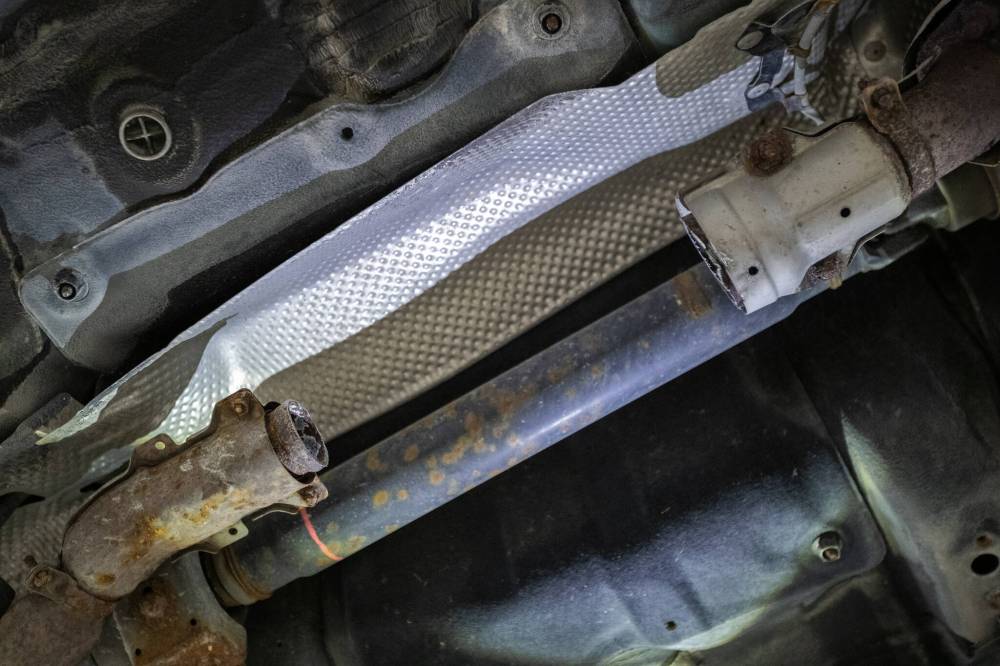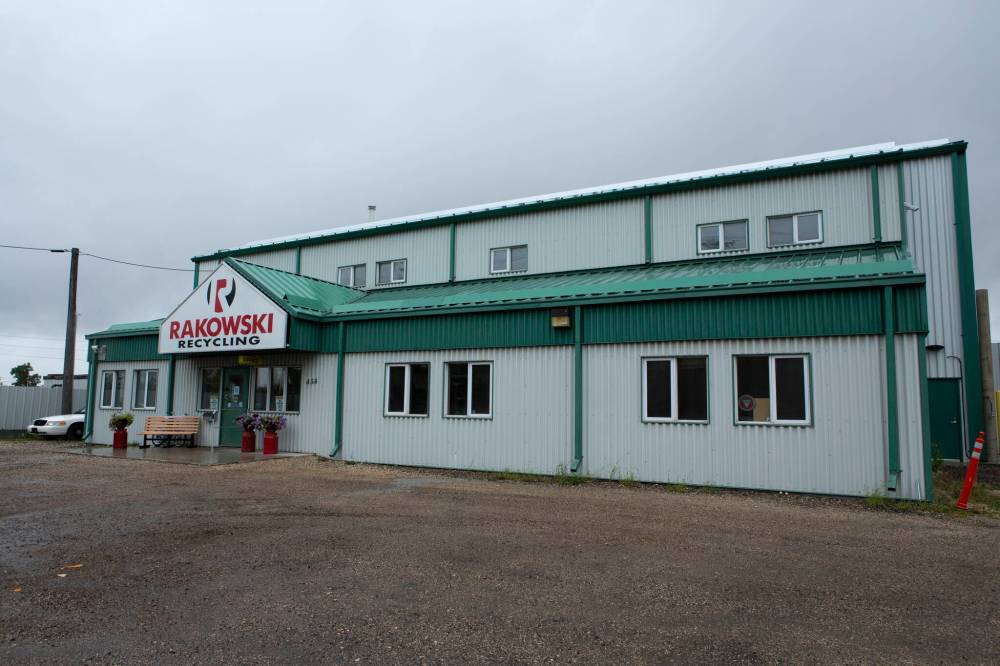‘It’s a knee-jerk reaction’
Scrap-metal recyclers dubious about province’s anti-theft legislation
Advertisement
Read this article for free:
or
Already have an account? Log in here »
To continue reading, please subscribe:
Monthly Digital Subscription
$0 for the first 4 weeks*
- Enjoy unlimited reading on winnipegfreepress.com
- Read the E-Edition, our digital replica newspaper
- Access News Break, our award-winning app
- Play interactive puzzles
*No charge for 4 weeks then price increases to the regular rate of $19.00 plus GST every four weeks. Offer available to new and qualified returning subscribers only. Cancel any time.
Monthly Digital Subscription
$4.75/week*
- Enjoy unlimited reading on winnipegfreepress.com
- Read the E-Edition, our digital replica newspaper
- Access News Break, our award-winning app
- Play interactive puzzles
*Billed as $19 plus GST every four weeks. Cancel any time.
To continue reading, please subscribe:
Add Free Press access to your Brandon Sun subscription for only an additional
$1 for the first 4 weeks*
*Your next subscription payment will increase by $1.00 and you will be charged $16.99 plus GST for four weeks. After four weeks, your payment will increase to $23.99 plus GST every four weeks.
Read unlimited articles for free today:
or
Already have an account? Log in here »
Hey there, time traveller!
This article was published 18/07/2022 (1239 days ago), so information in it may no longer be current.
Manitoba scrap-metal recyclers will be forced to collect a tonne of new information from customers as legislation intended to curb rampant metal and catalytic converter theft comes into force.
However, the added paperwork for local businesses and new authority given to police under The Scrap Metal Act will do little to deter thefts that are driving up costs for Manitobans, scrap dealers say.
“People who feel the necessity to commit a crime will continue to commit those crimes for whatever needs they need to fill,” Western Scrap Metals manager Al Linder told the Free Press.

Linder has been at the helm of the South Point Douglas scrap yard for 65 years and said staff are careful to reject any materials they suspect were illegally obtained.
He acknowledged the increased theft of catalytic converters and valuable metals from construction sites, public infrastructure and businesses in exchange for cash at scrap yards is a problem, but legislation sponsored by the Tory government will not be effective.
“It’s a knee-jerk reaction to the situation,” Linder said. “There will be a learning curve to make sure that we comply with the government’s regulations, because we’ve never had any problems like that. What the effects will be, nobody can say.”
The Scrap Metal Act was first introduced in December in response to an increase in thefts of costly catalytic converters. In 2021, Manitoba Public Insurance received 1,564 claims compared to 336 in 2020. In the first five months of this year, there have been 1,248 claims.
The vehicle exhaust system component helps remove harmful greenhouse gases, converting dangerous compounds into less-harmful substances before they’re released into the atmosphere. Converters contain platinum, rhodium and palladium, three rare earth metals that have significantly increased in value over the past decade.
The legislation became law in June and officially goes into force July 18.
Scrap-metal sellers must provide government-issued identification, a photograph of their face, description of their wares and how they acquired the materials. Buyers cannot accept the material unless that information is provided and the dealer keeps a copy of the seller’s personal information.
Buyers must also keep a record of the date, time and value of the transaction, record the licence plate number on the vehicle used to deliver the material and take photo of product, in some cases. Buyers must keep records for two years and provide information pertaining to restricted items (catalytic converters, sewer grates, metal grave markers, among others) to law enforcement at regular intervals. Police can also enter scrap-metal yards without a warrant to enforce the act.
Cash payments will also be prohibited in transactions involving restricted materials worth more than a set amount. As of Friday, regulations accompanying the legislation had not been published.
Scrap recyclers must also contact police immediately if they have reasonable grounds to believe material they purchased was stolen. Maximum fines for not complying with the legislation is $15,000 for a first offence and $50,000 for a second or subsequent offence.
“How do we know what’s suspicious, for God’s sake? Scrap metal is scrap metal,” Linder said, adding the province is expecting business owners to enforce its laws without compensation for purchased material if it is, in fact, stolen.
“We have no way of knowing realistically whether or not a piece of merchandise or whatever it is has been illegally obtained by the customer,” he said. “If the authorities have an interest in the material, then it’s their job to get that information.”
Rakowski Recycling owner Yanek Rakowski said the legislation will result in only minor changes to his business, as most information required under the law is already recorded. He said the legislation “is not going to deter anything.”
“It’s about policing, not putting it on the recyclers to try and curb the problem,” the St. Boniface-area scrap yard operator said.

“We vet most customers that come in. If it’s suspicious materials, we just don’t buy it because we’re not interested in dealing with those types of people,” he said. “So, I don’t know what collecting information is going to do and how that’s going to help anybody.”
Rakowski said his operation proactively reports suspicious materials to police and offers access to its records, if requested.
In a statement to the Free Press, the Winnipeg Police Service said it is “looking forward to how the (initiation) and enforcement of The Scrap Metal Act will hold businesses accountable.”
Last month, police raided a Springfield-area scrap yard as part of a months-long investigation into the sale of stolen catalytic converters and charged three men for allegedly trading in large quantities of stolen goods. At the time, police said further legislative measures — including a requirement to have unique identifying numbers on the parts — would be welcome.
Elmwood NDP MLA Jim Maloway said the Tory legislation is a good step forward but agreed it will not go far enough to drive down converter theft.
“We know the bill is not going to be the answer totally here,” Maloway said. “We shouldn’t put this all on the scrap dealers. We need to look at this with a multi-pronged approach.”
Maloway introduced a private member’s bill in April requiring auto dealers to mark the vehicle identification number on converters of vehicles they sell. Justice Minister Kelvin Goertzen has not yet committed to supporting the private member’s bill in the fall, Maloway said.
Manitoba Public Insurance could also be required to offer discounts to vehicle owners who have converters engraved with VINs, he suggested.
However, as it stands, Maloway said scrap-metal recyclers must comply with the new rules despite their displeasure with the legislation.
“I’m sympathetic to the point that this is going to cost them a little bit, for sure,” he said. “It’s there to try and go after the problem.”
danielle.dasilva@freepress.mb.ca

Our newsroom depends on a growing audience of readers to power our journalism. If you are not a paid reader, please consider becoming a subscriber.
Our newsroom depends on its audience of readers to power our journalism. Thank you for your support.







